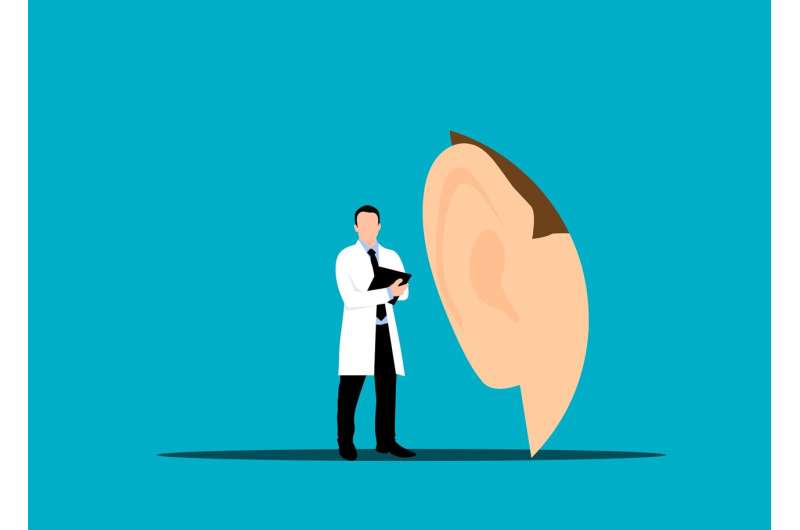If you woke up one morning and found you couldn't see out of one eye, odds are you'd call the eye doctor immediately—or even go to the emergency room. But we don't tend to treat sudden hearing loss in one or both ears with the same sense of urgency, and that's unfortunate, says Elias Michaelides, MD, an ear, nose and throat specialist at RUSH.
"People might expect that a hearing loss could be due to earwax or maybe an ear infection and might not realize that they have a potentially severe problem," Michaelides says.
But sudden sensorineural hearing loss—also called sudden hearing loss or sudden deafness—is far more serious than an ear plugged with wax, and immediate treatment is crucial. Sensorineural hearing loss occurs when the inner ear or nerve pathways connecting the inner ear to the brain are damaged.
"Sometimes we see damage to the inner ear that could be permanent if not treated immediately," Michaelides says. "It's important to have a proper diagnosis so that we can determine if immediate therapy to reverse the hearing loss is necessary."
Is it earwax, or something more serious?
If your hearing has suddenly diminished, how do you know whether your ear is plugged or if it's something requiring immediate medical attention?
People with earwax buildup may feel some pressure with a ringing sound, called tinnitus, in one or both ears. But these can also be signs of a more serious issue and should be examined by a physician. "Sudden onset tinnitus in one ear or significant ear fullness can be a sign of inner ear damage," Michaelides says.
Unlike the slow buildup of earwax, sudden hearing loss in one or both ears occurs very rapidly—over a few hours or, at the most, a few days. It usually strikes adults between 30 and 60 years old (though it can happen to anyone), and most people with the condition experience loss in only one ear.
Michaelides advises that people who experience any hearing loss seek care instead of assuming it is due to wax buildup. "I would recommend that you see your primary care physician or an urgent care center to look for any evidence of ear canal or eardrum issues. Period," he says. "If there is none, immediately seek out a hearing test or a visit with an ENT for further evaluation."
Many causes of sudden hearing loss, many treatments
There are dozens of possible causes of sudden hearing loss, so when a patient comes in for treatment, Michaelides and his colleagues conduct a detailed examination to discover what's behind it.
Top causes of sudden hearing loss include the following:
- Ongoing exposure to loud music
- Illnesses such as mumps, meningitis, multiple sclerosis or measles
- Head trauma
- Drugs such as aspirin, cisplatin and quinine, or the antibiotics streptomycin and gentamicin
- Genetics (it can be passed along from generation to generation)
Sometimes the problem proves to be high platelet count in the blood or a blockage in the cochlear artery, which carries blood from the heart to the ear. Other potential causes include overuse of opiate drugs and autoimmune inner ear disease, in which the body's immune system attacks part of the ear.
To determine the cause of your sudden hearing loss, the doctor will ask these questions[:]
- When did you first notice hearing loss? Was it sudden or gradual?
- Does it affect one ear or both ears?
- Do you have a history of ear infection?
- Do you have a family history of hearing loss?
- Have you been sick recently? What is your history of illnesses?
- Have you been exposed to loud noises at home or at work?
- Have you had any head injuries?
When physicians identify one of these diseases, they can treat the hearing loss by targeting the underlying condition.
In most cases, though, sudden hearing loss is idiopathic, meaning doctors can't determine its cause. In such instances, they often prescribe oral steroids, which have been shown to help patients recover from unexplained sudden hearing loss.
For some patients who have medical conditions such as osteoporosis or diabetes that can make taking steroids inadvisable, physicians at RUSH inject the medication directly into the ear's tympanic membrane to limit potential effects on the rest of the body.
Unraveling the mystery
In the hopes of eventually targeting treatments even more precisely, researchers are trying to unearth the reason behind most idiopathic sudden hearing loss. One theory is that it may result from a virus that attacks the inner ear, Michaelides says, affecting the cochlea (a spiral-shaped cavity of the inner ear that contains nerve endings essential for hearing) and causing the ear not to work.
"Other theories are that there may be a rupture of a small membrane within the cochlea or perhaps a tiny, microscopic blood clot in the blood supply to the inner ear," Michaelides says. "There are many causes of hearing loss. Some of them may be very benign and resolve themselves, but sometimes damage could be permanent if it's not appropriately treated."
Regardless of the cause, Michaelides urges those who have symptoms to seek immediate care. "If there is a sudden change in hearing, evaluating it within the first two weeks is always helpful."
- Mutton
-

 1
1



Recommended Comments
Join the conversation
You can post now and register later. If you have an account, sign in now to post with your account.
Note: Your post will require moderator approval before it will be visible.